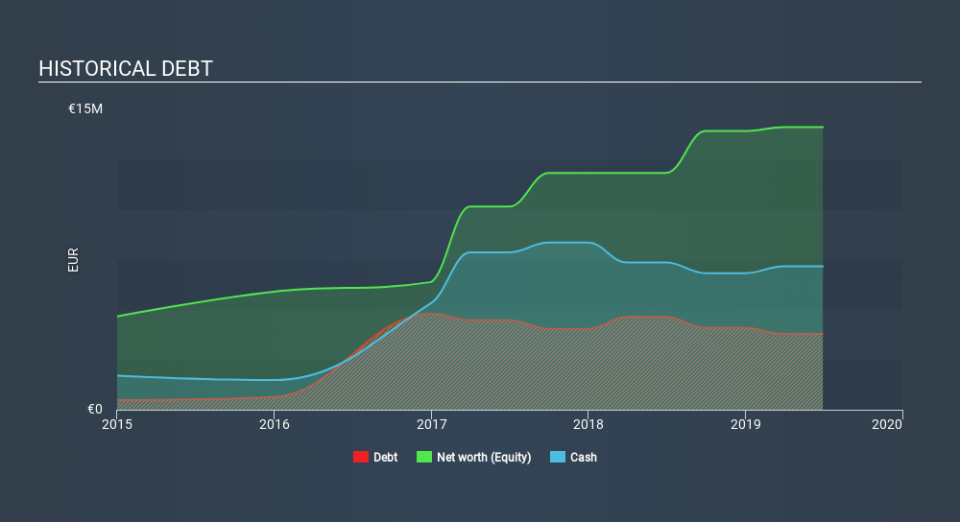Finlogic (BIT:FNL) Seems To Use Debt Rather Sparingly

Some say volatility, rather than debt, is the best way to think about risk as an investor, but Warren Buffett famously said that 'Volatility is far from synonymous with risk'. When we think about how risky a company is, we always like to look at its use of debt, since debt overload can lead to ruin. As with many other companies Finlogic S.p.A. (BIT:FNL) makes use of debt. But the real question is whether this debt is making the company risky.
Why Does Debt Bring Risk?
Debt is a tool to help businesses grow, but if a business is incapable of paying off its lenders, then it exists at their mercy. In the worst case scenario, a company can go bankrupt if it cannot pay its creditors. However, a more usual (but still expensive) situation is where a company must dilute shareholders at a cheap share price simply to get debt under control. By replacing dilution, though, debt can be an extremely good tool for businesses that need capital to invest in growth at high rates of return. When we examine debt levels, we first consider both cash and debt levels, together.
View our latest analysis for Finlogic
What Is Finlogic's Net Debt?
You can click the graphic below for the historical numbers, but it shows that Finlogic had €3.79m of debt in June 2019, down from €4.64m, one year before. However, it does have €7.16m in cash offsetting this, leading to net cash of €3.38m.
How Strong Is Finlogic's Balance Sheet?
We can see from the most recent balance sheet that Finlogic had liabilities of €9.05m falling due within a year, and liabilities of €4.40m due beyond that. On the other hand, it had cash of €7.16m and €11.9m worth of receivables due within a year. So it actually has €5.66m more liquid assets than total liabilities.
This short term liquidity is a sign that Finlogic could probably pay off its debt with ease, as its balance sheet is far from stretched. Simply put, the fact that Finlogic has more cash than debt is arguably a good indication that it can manage its debt safely.
Also positive, Finlogic grew its EBIT by 25% in the last year, and that should make it easier to pay down debt, going forward. There's no doubt that we learn most about debt from the balance sheet. But it is future earnings, more than anything, that will determine Finlogic's ability to maintain a healthy balance sheet going forward. So if you're focused on the future you can check out this free report showing analyst profit forecasts.
Finally, a company can only pay off debt with cold hard cash, not accounting profits. While Finlogic has net cash on its balance sheet, it's still worth taking a look at its ability to convert earnings before interest and tax (EBIT) to free cash flow, to help us understand how quickly it is building (or eroding) that cash balance. Looking at the most recent three years, Finlogic recorded free cash flow of 35% of its EBIT, which is weaker than we'd expect. That's not great, when it comes to paying down debt.
Summing up
While we empathize with investors who find debt concerning, you should keep in mind that Finlogic has net cash of €3.38m, as well as more liquid assets than liabilities. And we liked the look of last year's 25% year-on-year EBIT growth. So we don't think Finlogic's use of debt is risky. The balance sheet is clearly the area to focus on when you are analysing debt. But ultimately, every company can contain risks that exist outside of the balance sheet. For instance, we've identified 3 warning signs for Finlogic that you should be aware of.
When all is said and done, sometimes its easier to focus on companies that don't even need debt. Readers can access a list of growth stocks with zero net debt 100% free, right now.
If you spot an error that warrants correction, please contact the editor at editorial-team@simplywallst.com. This article by Simply Wall St is general in nature. It does not constitute a recommendation to buy or sell any stock, and does not take account of your objectives, or your financial situation. Simply Wall St has no position in the stocks mentioned.
We aim to bring you long-term focused research analysis driven by fundamental data. Note that our analysis may not factor in the latest price-sensitive company announcements or qualitative material. Thank you for reading.



